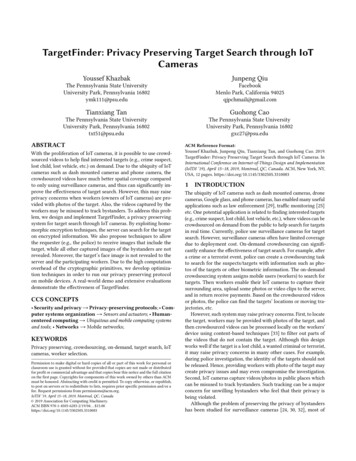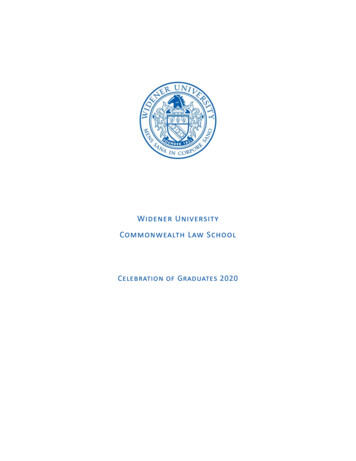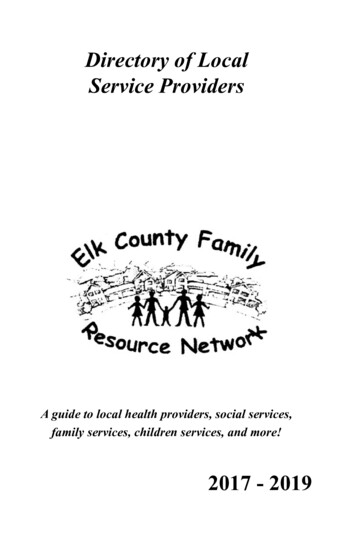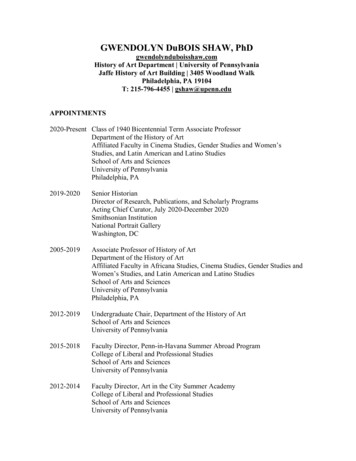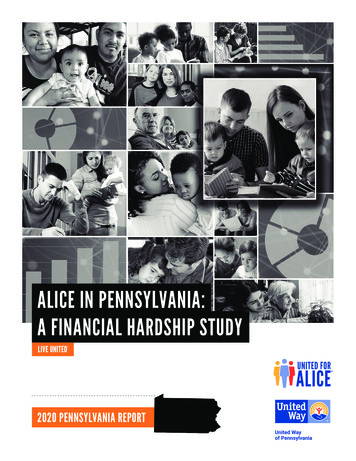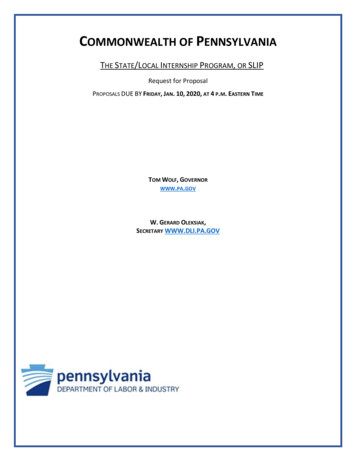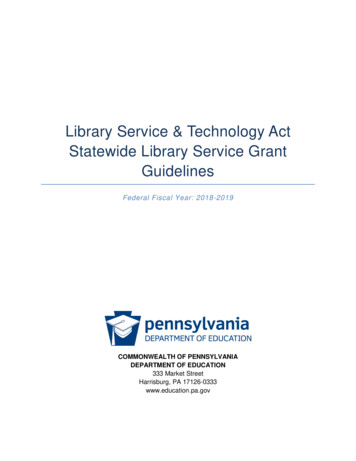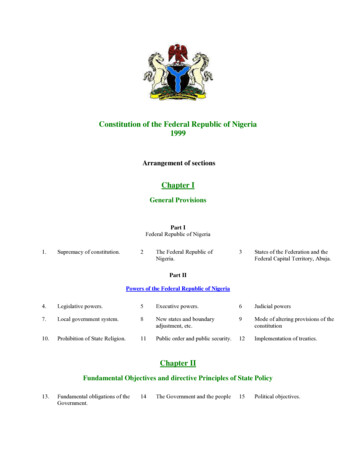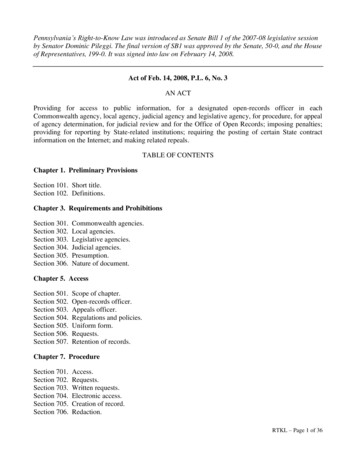
Transcription
Pennsylvania’s Right-to-Know Law was introduced as Senate Bill 1 of the 2007-08 legislative sessionby Senator Dominic Pileggi. The final version of SB1 was approved by the Senate, 50-0, and the Houseof Representatives, 199-0. It was signed into law on February 14, 2008.Act of Feb. 14, 2008, P.L. 6, No. 3AN ACTProviding for access to public information, for a designated open-records officer in eachCommonwealth agency, local agency, judicial agency and legislative agency, for procedure, for appealof agency determination, for judicial review and for the Office of Open Records; imposing penalties;providing for reporting by State-related institutions; requiring the posting of certain State contractinformation on the Internet; and making related repeals.TABLE OF CONTENTSChapter 1. Preliminary ProvisionsSection 101. Short title.Section 102. Definitions.Chapter 3. Requirements and ProhibitionsSection 301.Section 302.Section 303.Section 304.Section 305.Section 306.Commonwealth agencies.Local agencies.Legislative agencies.Judicial agencies.Presumption.Nature of document.Chapter 5. AccessSection 501.Section 502.Section 503.Section 504.Section 505.Section 506.Section 507.Scope of chapter.Open-records officer.Appeals officer.Regulations and policies.Uniform form.Requests.Retention of records.Chapter 7. ProcedureSection 701.Section 702.Section 703.Section 704.Section 705.Section 706.Access.Requests.Written requests.Electronic access.Creation of record.Redaction.RTKL – Page 1 of 36
Section 707. Production of certain records.Section 708. Exceptions for public records.Chapter 9. Agency ResponseSection 901.Section 902.Section 903.Section 904.Section 905.General rule.Extension of time.Denial.Certified copies.Record discard.Chapter 11. Appeal of Agency DeterminationSection 1101. Filing of appeal.Section 1102. Appeals officers.Chapter 13. Judicial ReviewSection 1301.Section 1302.Section 1303.Section 1304.Section 1305.Section 1306.Section 1307.Section 1308.Section 1309.Section 1310.Commonwealth agencies, legislative agencies and judicial agencies.Local agencies.Notice and records.Court costs and attorney fees.Civil penalty.Immunity.Fee limitations.Prohibition.Practice and procedure.Office of Open Records.Chapter 15. State-Related InstitutionsSection 1501.Section 1502.Section 1503.Section 1504.Definition.Reporting.Contents of report.Copies and posting.Chapter 17. State Contract InformationSection 1701. Submission and retention of contracts.Section 1702. Public availability of contracts.Chapter 31. Miscellaneous ProvisionsSection 3101. Applicability.Section 3101.1. Relation to other laws.Section 3101.2. Severability.Section 3102. Repeals.Section 3103. References.Section 3104. Effective date.RTKL – Page 2 of 36
The General Assembly of the Commonwealth of Pennsylvania hereby enacts as follows:CHAPTER 1PRELIMINARY PROVISIONSSection 101. Short title.This act shall be known and may be cited as the Right-to-Know Law.Section 102. Definitions.The following words and phrases when used in this act shall have the meanings given to them in thissection unless the context clearly indicates otherwise:“Administrative proceeding.” A proceeding by an agency the outcome of which is required to bebased on a record or documentation prescribed by law or in which a statute or regulation isparticularized in application to individuals. The term includes an appeal.“Agency.” A Commonwealth agency, a local agency, a judicial agency or a legislative agency.“Aggregated data.” A tabulation of data which relate to broad classes, groups or categories so that it isnot possible to distinguish the properties of individuals within those classes, groups or categories.“Appeals officer.” As follows:(1) For a Commonwealth agency or a local agency, the appeals officer designated undersection 503(a).(2) For a judicial agency, the individual designated under section 503(b).(3) For a legislative agency, the individual designated under section 503(c).(4) For the Attorney General, State Treasurer, Auditor General and local agencies inpossession of criminal investigative records, the individual designated under section 503(d).“Commonwealth agency.” Any of the following:(1) Any office, department, authority, board, multistate agency or commission of the executivebranch, an independent agency and a State-affiliated entity. The term includes:(i) The Governor's Office.(ii) The Office of Attorney General, the Department of the Auditor General and theTreasury Department.(iii) An organization established by the Constitution of Pennsylvania, a statute or anexecutive order which performs or is intended to perform an essential governmentalfunction.(2) The term does not include a judicial or legislative agency.RTKL – Page 3 of 36
“Confidential proprietary information.” Commercial or financial information received by an agency:(1) which is privileged or confidential; and(2) the disclosure of which would cause substantial harm to the competitive position of theperson that submitted the information.“Financial record.” Any of the following:(1) Any account, voucher or contract dealing with:(i) the receipt or disbursement of funds by an agency; or(ii) an agency's acquisition, use or disposal of services, supplies, materials, equipmentor property.(2) The salary or other payments or expenses paid to an officer or employee of an agency,including the name and title of the officer or employee.(3) A financial audit report. The term does not include work papers underlying an audit.“Homeland security.” Governmental actions designed to prevent, detect, respond to and recover fromacts of terrorism, major disasters and other emergencies, whether natural or manmade. The termincludes activities relating to the following:(1) emergency preparedness and response, including preparedness and response activities byvolunteer medical, police, emergency management, hazardous materials and fire personnel;(2) intelligence activities;(3) critical infrastructure protection;(4) border security;(5) ground, aviation and maritime transportation security;(6) biodefense;(7) detection of nuclear and radiological materials; and(8) research on next-generation securities technologies.“Independent agency.” Any board, commission or other agency or officer of the Commonwealth, thatis not subject to the policy supervision and control of the Governor. The term does not include alegislative or judicial agency.“Judicial agency.” A court of the Commonwealth or any other entity or office of the unified judicialsystem.“Legislative agency.” Any of the following:RTKL – Page 4 of 36
(1) The Senate.(2) The House of Representatives.(3) The Capitol Preservation Committee.(4) The Center for Rural Pennsylvania.(5) The Joint Legislative Air and Water Pollution Control and Conservation Committee.(6) The Joint State Government Commission.(7) The Legislative Budget and Finance Committee.(8) The Legislative Data Processing Committee.(9) The Independent Regulatory Review Commission.(10) The Legislative Reference Bureau.(11) The Local Government Commission.(12) The Pennsylvania Commission on Sentencing.(13) The Legislative Reapportionment Commission.(14) The Legislative Office for Research Liaison.(15) The Legislative Audit Advisory Commission.“Legislative record.” Any of the following relating to a legislative agency or a standing committee,subcommittee or conference committee of a legislative agency:(1) A financial record.(2) A bill or resolution that has been introduced and amendments offered thereto in committeeor in legislative session, including resolutions to adopt or amend the rules of a chamber.(3) Fiscal notes.(4) A cosponsorship memorandum.(5) The journal of a chamber.(6) The minutes of, record of attendance of members at a public hearing or a public committeemeeting and all recorded votes taken in a public committee meeting.(7) The transcript of a public hearing when available.(8) Executive nomination calendars.(9) The rules of a chamber.RTKL – Page 5 of 36
(10) A record of all recorded votes taken in a legislative session.(11) Any administrative staff manuals or written policies.(12) An audit report prepared pursuant to the act of June 30, 1970 (P.L.442, No.151) entitled,“An act implementing the provisions of Article VIII, section 10 of the Constitution ofPennsylvania, by designating the Commonwealth officers who shall be charged with thefunction of auditing the financial transactions after the occurrence thereof of the Legislativeand Judicial branches of the government of the Commonwealth, establishing a LegislativeAudit Advisory Commission, and imposing certain powers and duties on such commission.”(13) Final or annual reports required by law to be submitted to the General Assembly.(14) Legislative Budget and Finance Committee reports.(15) Daily legislative session calendars and marked calendars.(16) A record communicating to an agency the official appointment of a legislative appointee.(17) A record communicating to the appointing authority the resignation of a legislativeappointee.(18) Proposed regulations, final-form regulations and final-omitted regulations submitted to alegislative agency.(19) The results of public opinion surveys, polls, focus groups, marketing research or similarefforts designed to measure public opinion funded by a legislative agency.“Local agency.” Any of the following:(1) Any political subdivision, intermediate unit, charter school, cyber charter school or publictrade or vocational school.(2) Any local, intergovernmental, regional or municipal agency, authority, council, board,commission or similar governmental entity.“Office of Open Records.” The Office of Open Records established in section 1310.“Personal financial information.” An individual's personal credit, charge or debit card information;bank account information; bank, credit or financial statements; account or PIN numbers and otherinformation relating to an individual's personal finances.“Privilege.” The attorney-work product doctrine, the attorney-client privilege, the doctor-patientprivilege, the speech and debate privilege or other privilege recognized by a court interpreting the lawsof this Commonwealth.“Public record.” A record, including a financial record, of a Commonwealth or local agency that:(1) is not exempt under section 708;RTKL – Page 6 of 36
(2) is not exempt from being disclosed under any other Federal or State law or regulation orjudicial order or decree; or(3) is not protected by a privilege.“Record.” Information, regardless of physical form or characteristics, that documents a transaction oractivity of an agency and that is created, received or retained pursuant to law or in connection with atransaction, business or activity of the agency. The term includes a document, paper, letter, map, book,tape, photograph, film or sound recording, information stored or maintained electronically and a dataprocessed or image-processed document.“Requester.” A person that is a legal resident of the United States and requests a record pursuant tothis act. The term includes an agency.“Response.” Access to a record or an agency's written notice to a requester granting, denying orpartially granting and partially denying access to a record.“Social services.” Cash assistance and other welfare benefits, medical, mental and other health careservices, drug and alcohol treatment, adoption services, vocational services and training, occupationaltraining, education services, counseling services, workers' compensation services and unemploymentcompensation services, foster care services, services for the elderly, services for individuals withdisabilities and services for victims of crimes and domestic violence.“State-affiliated entity.” A Commonwealth authority or Commonwealth entity. The term includes thePennsylvania Higher Education Assistance Agency and any entity established thereby, thePennsylvania Gaming Control Board, the Pennsylvania Game Commission, the Pennsylvania Fish andBoat Commission, the Pennsylvania Housing Finance Agency, the Pennsylvania Municipal RetirementBoard, the State System of Higher Education, a community college, the Pennsylvania TurnpikeCommission, the Pennsylvania Public Utility Commission, the Pennsylvania Infrastructure InvestmentAuthority, the State Public School Building Authority, the Pennsylvania Interscholastic AthleticAssociation and the Pennsylvania Higher Educational Facilities Authority. The term does not include aState-related institution.“State-related institution.” Includes:(1) Temple University.(2) The University of Pittsburgh.(3) The Pennsylvania State University.(4) Lincoln University.“Terrorist act.” A violent or life-threatening act that violates the criminal laws of the United States orany state and appears to be intended to:(1) intimidate or coerce a civilian population;(2) influence the policy of a government; orRTKL – Page 7 of 36
(3) affect the conduct of a government by mass destruction, assassination or kidnapping.“Trade secret.” Information, including a formula, drawing, pattern, compilation, including a customerlist, program, device, method, technique or process that:(1) derives independent economic value, actual or potential, from not being generally known toand not being readily ascertainable by proper means by other persons who can obtain economicvalue from its disclosure or use; and(2) is the subject of efforts that are reasonable under the circumstances to maintain its secrecy.The term includes data processing software obtained by an agency under a licensing agreementprohibiting disclosure.RTKL – Page 8 of 36
CHAPTER 3REQUIREMENTS AND PROHIBITIONSSection 301. Commonwealth agencies.(a) Requirement.--A Commonwealth agency shall provide public records in accordance with thisact.(b) Prohibition.--A Commonwealth agency may not deny a requester access to a public recorddue to the intended use of the public record by the requester unless otherwise provided by law.Section 302. Local agencies.(a) Requirement.--A local agency shall provide public records in accordance with this act.(b) Prohibition.--A local agency may not deny a requester access to a public record due to theintended use of the public record by the requester unless otherwise provided by law.Section 303. Legislative agencies.(a) Requirement.--A legislative agency shall provide legislative records in accordance with thisact.(b) Prohibition.--A legislative agency may not deny a requester access to a legislative record dueto the intended use of the legislative record by the requester.Section 304. Judicial agencies.(a) Requirement.--A judicial agency shall provide financial records in accordance with this act orany rule or order of court providing equal or greater access to the records.(b) Prohibition.--A judicial agency may not deny a requester access to a financial record due tothe intended use of the financial record by the requester.Section 305. Presumption.(a) General rule.--A record in the possession of a Commonwealth agency or local agency shall bepresumed to be a public record. The presumption shall not apply if:(1) the record is exempt under section 708;(2) the record is protected by a privilege; or(3) the record is exempt from disclosure under any other Federal or State law or regulationor judicial order or decree.(b) Legislative records and financial records.--A legislative record in the possession of alegislative agency and a financial record in the possession of a judicial agency shall be presumed to beavailable in accordance with this act. The presumption shall not apply if:(1) the record is exempt under section 708;RTKL – Page 9 of 36
(2) the record is protected by a privilege; or(3) the record is exempt from disclosure under any other Federal or State law, regulation orjudicial order or decree.Section 306. Nature of document.Nothing in this act shall supersede or modify the public or nonpublic nature of a record ordocument established in Federal or State law, regulation or judicial order or decree.RTKL – Page 10 of 36
CHAPTER 5ACCESSSection 501. Scope of chapter.This chapter applies to all agencies.Section 502. Open-records officer.(a) Establishment.-(1) An agency shall designate an official or employee to act as the open-records officer.(2) For a legislative agency other than the Senate or the House of Representatives, the openrecords officer designated by the Legislative Reference Bureau shall serve as the open-recordsofficer. Notwithstanding paragraph (1), a political party caucus of a legislative agency mayappoint an open-records officer under this section.(b) Functions.-(1) The open-records officer shall receive requests submitted to the agency under this act,direct requests to other appropriate persons within the agency or to appropriate persons in anotheragency, track the agency's progress in responding to requests and issue interim and final responsesunder this act.(2) Upon receiving a request for a public record, legislative record or financial record, theopen-records officer shall do all of the following:(i) Note the date of receipt on the written request.(ii) Compute the day on which the five-day period under section 901 will expire andmake a notation of that date on the written request.(iii) Maintain an electronic or paper copy of a written request, including alldocuments submitted with the request until the request has been fulfilled. If the request isdenied, the written request shall be maintained for 30 days or, if an appeal is filed, until afinal determination is issued under section 1101(b) or the appeal is deemed denied.(iv) Create a file for the retention of the original request, a copy of the response, arecord of written communications with the requester and a copy of other communications.This subparagraph shall only apply to Commonwealth agencies.Section 503. Appeals officer.(a) Commonwealth agencies and local agencies.--Except as provided in subsection (d), the Officeof Open Records established under section 1310 shall designate an appeals officer under section1101(a)(2) for all:(1) Commonwealth agencies; and(2) local agencies.RTKL – Page 11 of 36
(b) Judicial agencies.--A judicial agency shall designate an appeals officer to hear appeals underChapter 11.(c) Legislative agencies.-(1) Except as set forth in paragraph (2), the Legislative Reference Bureau shall designate anappeals officer to hear appeals under Chapter 11 for all legislative agencies.(2) Each of the following shall designate an appeals officer to hear appeals under Chapter11:(i) The Senate.(ii) The House of Representatives.(d) Law enforcement records and Statewide officials.-(1) The Attorney General, State Treasurer and Auditor General shall each designate anappeals officer to hear appeals under Chapter 11.(2) The district attorney of a county shall designate one or more appeals officers to hearappeals under Chapter 11 relating to access to criminal investigative records in possession of alocal agency of that county. The appeals officer designated by the district attorney shall determineif the record requested is a criminal investigative record.Section 504. Regulations and policies.(a) Authority.--An agency may promulgate regulations and policies necessary for the agency toimplement this act. The Office of Open Records may promulgate regulations relating to appealsinvolving a Commonwealth agency or local agency.(b) Posting.--The following information shall be posted at each agency and, if the agencymaintains an Internet website, on the agency's Internet website:(1) Contact information for the open-records officer.(2) Contact information for the Office of Open Records or other applicable appeals officer.(3) A form which may be used to file a request.(4) Regulations, policies and procedures of the agency relating to this act.Section 505. Uniform form.(a) Commonwealth and local agencies.--The Office of Open Records shall develop a uniformform which shall be accepted by all Commonwealth and local agencies in addition to any form used bythe agency to file a request under this act. The uniform form shall be published in the PennsylvaniaBulletin and on the Office of Open Record's Internet website.RTKL – Page 12 of 36
(b) Judicial agencies.--A judicial agency or the Administrative Office of Pennsylvania Courtsmay develop a form to request financial records or may accept a form developed by the Office of OpenRecords.(c) Legislative agencies.--A legislative agency may develop a form to request legislative recordsor may accept the form developed by the Office of Open Records.Section 506. Requests.(a) Disruptive requests.-(1) An agency may deny a requester access to a record if the requester has made repeatedrequests for that same record and the repeated requests have placed an unreasonable burden on theagency.(2) A denial under this subsection shall not restrict the ability to request a different record.(b) Disaster or potential damage.-(1) An agency may deny a requester access:(i) when timely access is not possible due to fire, flood or other disaster; or(ii) to historical, ancient or rare documents, records, archives and manuscripts whenaccess may, in the professional judgment of the curator or custodian of records, causephysical damage or irreparable harm to the record.(2) To the extent possible, the contents of a record under this subsection shall be madeaccessible to a requester even when the record is physically unavailable.(c) Agency discretion.--An agency may exercise its discretion to make any otherwise exemptrecord accessible for inspection and copying under this chapter, if all of the following apply:(1) Disclosure of the record is not prohibited under any of the following:(i) Federal or State law or regulation.(ii) Judicial order or decree.(2) The record is not protected by a privilege.(3) The agency head determines that the public interest favoring access outweighs anyindividual, agency or public interest that may favor restriction of access.(d) Agency possession.-(1) A public record that is not in the possession of an agency but is in the possession of aparty with whom the agency has contracted to perform a governmental function on behalf of theagency, and which directly relates to the governmental function and is not exempt under this act,shall be considered a public record of the agency for purposes of this act.RTKL – Page 13 of 36
(2) Nothing in this act shall be construed to require access to any other record of the partyin possession of the public record.(3) A request for a public record in possession of a party other than the agency shall besubmitted to the open records officer of the agency. Upon a determination that the record issubject to access under this act, the open records officer shall assess the duplication fee establishedunder section 1307(b) and upon collection shall remit the fee to the party in possession of therecord if the party duplicated the record.Section 507. Retention of records.Nothing in this act shall be construed to modify, rescind or supersede any record retention policyor disposition schedule of an agency established pursuant to law, regulation, policy or other directive.RTKL – Page 14 of 36
CHAPTER 7PROCEDURESection 701. Access.(a) General rule.--Unless otherwise provided by law, a public record, legislative record orfinancial record shall be accessible for inspection and duplication in accordance with this act. A recordbeing provided to a requester shall be provided in the medium requested if it exists in that medium;otherwise, it shall be provided in the medium in which it exists. Public records, legislative records orfinancial records shall be available for access during the regular business hours of an agency.(b) Construction.--Nothing in this act shall be construed to require access to any computer eitherof an agency or individual employee of an agency.Section 702. Requests.Agencies may fulfill verbal, written or anonymous verbal or written requests for access to recordsunder this act. If the requester wishes to pursue the relief and remedies provided for in this act, therequest for access to records must be a written request.Section 703. Written requests.A written request for access to records may be submitted in person, by mail, by e-mail, byfacsimile or, to the extent provided by agency rules, by any other electronic means. A written requestmust be addressed to the open-records officer designated pursuant to section 502. Employees of anagency shall be directed to forward requests for records to the open-records officer. A written requestshould identify or describe the records sought with sufficient specificity to enable the agency toascertain which records are being requested and shall include the name and address to which theagency should address its response. A written request need not include any explanation of therequester's reason for requesting or intended use of the records unless otherwise required by law.Section 704. Electronic access.(a) General rule.--In addition to the requirements of section 701, an agency may make its recordsavailable through any publicly accessible electronic means.(b) Response.-(1) In addition to the requirements of section 701, an agency may respond to a request bynotifying the requester that the record is available through publicly accessible electronic means orthat the agency will provide access to inspect the record electronically.(2) If the requester is unwilling or unable to access the record electronically, the requestermay, within 30 days following receipt of the agency notification, submit a written request to theagency to have the record converted to paper. The agency shall provide access to the record inprinted form within five days of the receipt of the written request for conversion to paper.Section 705. Creation of record.RTKL – Page 15 of 36
When responding to a request for access, an agency shall not be required to create a record whichdoes not currently exist or to compile, maintain, format or organize a record in a manner in which theagency does not currently compile, maintain, format or organize the record.Section 706. Redaction.If an agency determines that a public record, legislative record or financial record containsinformation which is subject to access as well as information which is not subject to access, theagency's response shall grant access to the information which is subject to access and deny access tothe information which is not subject to access. If the information which is not subject to access is anintegral part of the public record, legislative record or financial record and cannot be separated, theagency shall redact from the record the information which is not subject to access, and the responseshall grant access to the information which is subject to access. The agency may not deny access to therecord if the information which is not subject to access is able to be redacted. Information which anagency redacts in accordance with this subsection shall be deemed a denial under Chapter 9.Section 707. Production of certain records.(a) General rule.--If, in response to a request, an agency produces a record that is not a publicrecord, legislative record or financial record, the agency shall notify any third party that provided therecord to the agency, the person that is the subject of the record and the requester.(b) Requests for trade secrets.--An agency shall notify a third party of a request for a record if thethird party provided the record and included a written statement signed by a representative of the thirdparty that the record contains a trade secret or confidential proprietary information. Notification shallbe provided within five business days of receipt of the request for the record. The third party shall havefive business days from receipt of notification from the agency to provide input on the release of therecord. The agency shall deny the request for the record or release the record within ten business daysof the provision of notice to the third party and shall notify the third party of the decision.(c) Transcripts.-(1) Prior to an adjudication becoming final, binding and nonappealable, a transcript of anadministrative proceeding shall be provided to a requester by the agency stenographer or a courtreporter, in accordance with agency procedure or an applicable contract.(2) Following an adjudication becoming final, binding and nonappealable, a transcript of anadministrative proceeding shall be provided to a requester in accordance with the duplication ratesestablished in section 1307(b).Section 708. Exceptions for public records.(a) Burden of proof.-(1) The burden of proving that a record of a Commonwealth agency or local agency isexempt from public access shall be on the Commonwealth agency or local agency receiving arequest by a preponderance of the evidence.(2) The burden of proving that a legislative record is exempt from public access shall be onthe legislative agency receiving a request by a preponderance of the evidence.RTKL – Page 16 of 36
(3) The burden of proving that a financial record of a judicial agency is exempt from publicaccess shall be on the judicial agency receiving a request by a preponderance of the evidence.(b) Exceptions.--Except as provided in subsections (c) and (d), the following are exempt fromaccess by a requester under this act:(1) A record, the disclosure of which:(i) would result in the loss of Federal or State funds by an agency or theCommonwealth; or(ii) would be reasonably likely to result in a substantial and demonstrable risk ofphysical harm to or the personal security of an individual.(2) A record maintained by an agency in connection with the military, homeland security,national defense, law enforcement or other public safety activity that, if disclosed, would bereasonably likely to jeopardize or threaten public safety or preparedness or public protectionactivity or a record that is designated classified by an appropria
(6) The Joint State Government Commission. (7) The Legislative Budget and Finance Committee. (8) The Legislative Data Processing Committee. (9) The Independent Regulatory Review Commission. (10) The Legislative Reference Bureau. (11) The Local Government Commission. (12) The Pennsylvania Commission on Sentencing.

